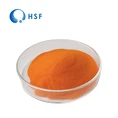In several cases, BCAA supplements are beneficial. First of all, if you are a competitive athlete or bodybuilder, you often put a lot of pressure on your muscles, then BCAA can help your body recover faster, so you can train more frequently.
Eating a regular meal rich in high-quality protein and complex carbohydrates is just as effective, although there are practical benefits to chewing on some pleasant, less supportive and low-calorie supplements after a hard workout.
The BCAA supplement can be prepared in a few minutes, and then you can eat other favorite foods in the following dinner.
Secondly, if you are unable to eat a lot of leucine-rich foods due to conditions, and want to gain muscle quickly, BCAA is also helpful. Animal-derived food is a natural high-quality source of leucine, so if you eat meat and dairy products regularly, supplements may not be necessary unless your training intensity is very high.
Vegetarians who want to build big muscles can benefit from leucine supplements because the leucine content of plant protein is usually less than that of animal protein. If your diet contains a lot of animal protein, or if you are not doing strength training, you do not need to take BCAA supplements.
A leucine-rich diet may increase the risk of type II diabetes or obesity, because theoretically this compound will send a "growth!" signal to all parts of the body, and this kind of growth is not limited to it. Gluteal muscles.
This mechanism may partly explain why animal foods such as red meat are associated with an increased risk of obesity and diabetes, although it is unclear how important it is. Just like nutrients, it also depends on other lifestyle factors and your exercise goals.
If you are exercising actively and regularly, supplementing with more leucine is more beneficial than harmful.
In summary, if you are pursuing a breakthrough in strong physique or athletic performance, the helping effect of legal and compliant supplements is not the most important. To a large extent, it depends on regular resistance training and adequate intake. The protein, dietary fiber and calories, hormones and genetic factors. As with most things in life, there is no quick and easy shortcut to gain muscle.





